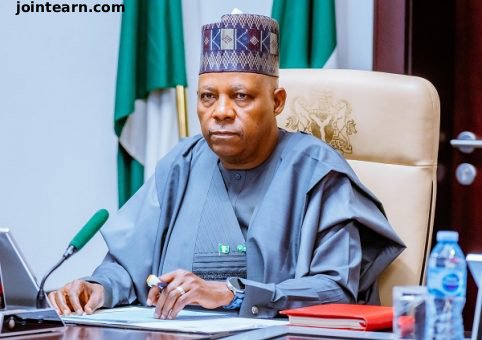
Vice President Kashim Shettima
The Federal Government has set a bold target to reduce cargo clearance time in Nigeria to under seven days by 2026, leveraging a National Single Window (NSW) system to modernize and digitize operations at the country’s ports.
Vice President Kashim Shettima, speaking at the second meeting of the Ports and Customs Efficiency Committee at the State House, Abuja, said the digital platform—scheduled for rollout in the first quarter of 2026—will harmonize documentation, minimize human contact, and enhance efficiency across all port operations.
“Our goal is to reduce the average cargo clearance time in Nigeria to under seven days by the end of 2026 and to position our ports among the top three most efficient trade gateways on the continent. The National Single Window will be a game changer,” Shettima said.
Currently, cargo dwell time in Nigeria averages 18 to 21 days, compared with 5–7 days in Ghana and as little as four days in Cotonou, Benin Republic. Clearance costs in Nigeria are estimated to be 30% higher than in peer economies. Shettima described these inefficiencies as an economic burden that discourages investment, drives up consumer prices, and undermines export competitiveness.
The Vice President also noted that a draft Executive Order mandating joint physical inspections of cargoes—to eliminate multiple examinations and bureaucratic overlap—is with President Bola Ahmed Tinubu for approval.
Shettima directed the Nigerian Ports Authority (NPA), Nigeria Customs Service (NCS), Standards Organisation of Nigeria (SON), Immigration Service, NAFDAC, and other key agencies to develop a roadmap to strengthen the national weights and measures system, ensuring consumer protection and fair trade practices.
“The era of siloed operations must end. Inter-agency rivalry must give way to inter-agency synergy. We are only as efficient as our collaboration allows,” he warned.
Officials attending the meeting emphasized the urgency of reforms. Princess Zahrah Audu, Director-General of the Presidential Enabling Business Environment Council (PEBEC), highlighted the economic cost of delays, while NPA Managing Director Dr. Abubakar Dantsoho noted ongoing infrastructure upgrades and joint inspection initiatives. He stressed that technology adoption, equipment improvement, and capacity building remain critical to achieving efficiency.
“Until there is partnership, you cannot achieve efficiency at the ports,” Dantsoho added.


Leave a Reply